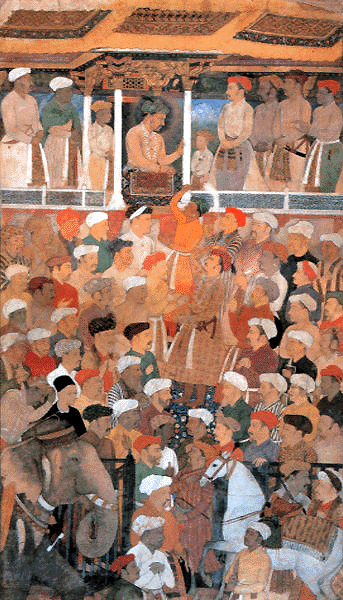
|
|
|
|
BY: SUN STAFF

Jahangir Darbar Sep 20, 2010 — CANADA (SUN) — A serial presentation of the Mughal effect on Vaisnava society. In 1605 A.D., Akbar's son, Jahangir, took over as Mughal Emperor, ruling until his death in 1627. Born in 1569, Jahangir's early life was marked by his appetite for royal entitlement and debauchery. Except for his famous 2nd wife, Nur Jahan, he seems to be most remembered for his appetite for bodily pleasure. At the same time, Jahangir presents us with many interesting examples of the intersection of Mughal rule and Vaishnavism, and this will be our primary focus in the brief survey of his reign.
Born as Prince Muhammad Salim, Jahangir was the third and eldest surviving son of Emperor Akbar. His twin brothers, Hasan and Hussain, died in infancy. Jahangir's mother was a prominent Rajput Princess from Amber named Jodhabai. At the age of 31, Prince Salim initiated a rebellion against his father in 1601, while Akbar was absent from the capital on expedition. Hearing that Salim had declared himself Emperor, Akbar quickly returned to Agra and put down the coup. While relative peace was maintained during the intervening four years, eight days after Akbar's death, Salim took the throne as Emperor Jahangir, and at age 36, began his own 22-year reign. As we have seen over the course of this series, each one of the Mughal emperors, from Babur to Humayun to Akbar to Jahangir, was succeeded by a son who prematurely tried to take power. Each son broke loyalty with his father, trying to overthrow him. This dishonorable legacy is a telling characteristic of a demoniac lineage. In the case of Jahangir, just one year after he took power, his son Khusrau Mirza tried to defeat him, arguing his right to the throne based on Akbar's will. To punish his son, Jahangir had the boy confined to his fort at Agra, and blinded him. In one of the most famous instances of Mughal hostility toward the Sikhs, Jahangir also put to death Sikh Guru Arjun, the Sikh spiritual advisor at the time, for giving money to Khusrau Mirza. Like his father and grandfather before him, the history books often tell the story that Jahangir was a benevolent man – tolerant of the Hindus, kind-hearted, interested in diverse spiritual practices, a protector of women and children, etc., but we can see in the continuation of the family drama the same cruel blood traveling down the line. Years later, Shah Jahan arranged for the murder of his younger brother, Khusrau Mirza, so that his own takeover of the throne would be uncontested. The Persians took advantage of the family's internal struggle at that point, and seized the city of Qandahar (Kandahar). This resulted in the Mughals losing their control over some of the most important trade routes in the region, between Afghanistan, Persian and Central Asia. It also exposed India to new invasions from the northwest.

Jahangir on the Throne When this history is viewed in the context of today's geo-political climate, and the karmic debt is considered for all the destruction visited upon Mother India, her temples, Deities and citizens, it is not surprising that Afghanistan and much of the Middle East are barren dirt today, fought over for nothing but the oil in the ground. Jahangir, like his father before him, pursued territory, power and prestige on the back of Islam, but he too became enamored by various aspects of the Vedic culture. Jahangir spent considerable time traveling to get the association of Vaisnava preachers in places like Allahabad, Ujjain and Mathura. According to the record put down by his court historians in the Jahangir-nama, he reached the same sort of incorrect conclusion his father had: that Vedanta and Muslim Sufism were nearly identical. We will discuss Jahangir's spiritual explorations amongst the Vaisnava sadhus when our series returns next week.
| |